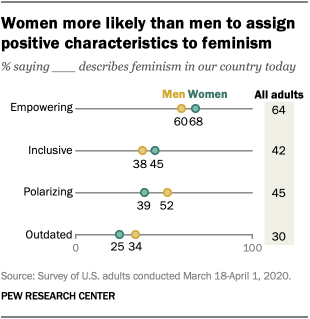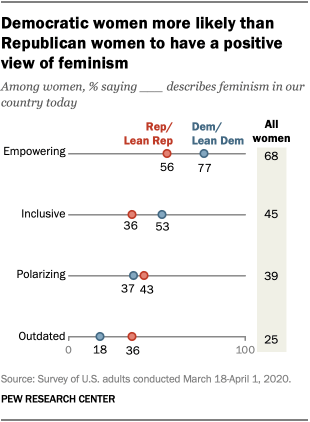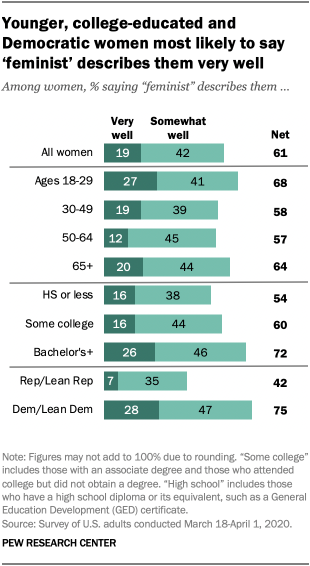
Since the early days of the U.S. women’s rights movement, the term “feminist” has been a source of much debate. Even in 2020 – 100 years after the passage of the 19th Amendment, which granted women the right to vote – Americans differ over how well the term describes them and how they see the movement, according to a new Pew Research Center survey.
Pew Research Center conducted this study to understand Americans’ views on feminism around the 100th anniversary of women getting the right to vote. For this analysis, we surveyed 3,143 U.S. adults in March and April 2020, including an oversample of Black and Hispanic respondents. The adults surveyed are members of Ipsos Public Affairs’ KnowledgePanel, an online survey panel that is recruited through national, random sampling of residential addresses and landline and cellphone numbers. KnowledgePanel provides internet access for those who do not have it and, if needed, a device to access the internet when they join the panel. To ensure that the results of this survey reflect a balanced cross section of the nation, the data is weighted to match the U.S. adult population by gender, age, education, race and ethnicity and other categories. The survey was conducted in English and Spanish.
Here are the questions used for this report, along with responses, and its methodology.
About six-in-ten U.S. women today say “feminist” describes them very (19%) or somewhat (42%) well. But the degree to which women consider themselves feminist differs substantially by age, education and political party, according to the survey.
Majorities of women across age groups say “feminist” describes them at least somewhat well, but those ages 50 to 64 are the least likely to say it describes them very well. Only 12% in this age group say this, compared with 27% of women ages 18 to 29, 19% of women ages 30 to 49 and 20% of women 65 and older.
About seven-in-ten women with at least a bachelor’s degree (72%) say the term feminist describes them very or somewhat well, compared with 56% of women with less education.
There are sharp partisan divides among women as well. Three-quarters of Democratic and Democratic-leaning women say the term feminist describes them very or somewhat well, compared with 42% of Republican and Republican-leaning women.
Among Democratic women, those with a bachelor’s degree or higher are more likely than those with less education to say feminist describes them well. In fact, 37% say the term describes them very well. Among Republican women, those with at least a bachelor’s degree are no more likely than those with less education to consider themselves feminists.
Women are not the only ones who identify with the term feminist. Four-in-ten men in the United States say this term describes them at least somewhat well. Democratic men are more than twice as likely as their Republican counterparts to say feminist describes them well (54% vs. 26%). And, like women, men with a bachelor’s degree or higher are more likely than those with less education to say the term describes them at least somewhat well (46% vs. 37%).
Most Americans say feminism is empowering, but many also see it as polarizing

Overall, the public says the feminist movement has contributed to the advancement of women’s rights in the U.S.: 22% say it’s done a great deal and 48% say it’s done a fair amount. But the public has mixed views on what feminism looks like today. A majority of Americans (64%) say feminism is empowering and 42% see it as inclusive. At the same time, 45% say it is polarizing and 30% say it’s outdated.
Notably, many of those who identify as feminist are critical of the feminist movement. For example, 43% of adults who say feminism describes them very or somewhat well also say feminism is polarizing, and 45% would not describe it as inclusive.
Women are more likely than men to associate feminism with positive attributes like empowering and inclusive, while men are more likely than women to see feminism as polarizing and outdated. Even so, six-in-ten men say feminism is empowering.
Among women, there are some key differences across demographic groups. Women younger than 50 are more likely than their older counterparts to say feminism is empowering (73% vs. 63%). Women younger than 30 stand out for being the most likely to say feminism is inclusive (56% say it is) and the least likely to say it’s outdated (only 17% say it is).
Women with a college degree have somewhat different views on feminism than women with less education. Those with a bachelor’s degree or more education are more likely to say feminism is empowering (76% vs. 64% of those with some college education or less) and inclusive (54% vs. 41%), but they’re also more likely to see it as polarizing (50% vs. 34%).

There are large partisan gaps in views about feminism, too. While 76% of Democrats say feminism is empowering, only 49% of Republicans say the same. Similarly, Democrats are more likely than Republicans to say feminism is inclusive (51% vs. 32%). For their part, Republicans are more likely than their Democratic counterparts to say feminism is polarizing (51% vs. 40%) and about twice as likely to say it’s outdated (42% vs. 20%).
These partisan patterns play out similarly among women and men. Democratic women are much more likely than Republican women to see feminism as empowering (77% vs. 56%) and inclusive (53% vs. 36%). Republican women are twice as likely as Democratic women to say feminism is outdated (36% vs. 18%).
There are racial and ethnic differences, too, in how people view feminism. White adults are more likely than Black and Hispanic adults to associate feminism with negative characteristics. Roughly half of white adults (49%) say feminism is polarizing, compared with 34% of Black and 36% of Hispanic adults. Similarly, while about a third (32%) of whites say feminism is outdated, roughly one-in-four Black (24%) and Hispanic (26%) adults say the same. When accounting for both race and gender, similar patterns remain.
Note: Here are the questions used for this report, along with responses, and its methodology.
CORRECTION (March 10, 2021): The subheads in the charts “Women more likely than men to assign positive characteristics to feminism” and “Democratic women more likely than Republican women to have a positive view of feminism” have been corrected to more accurately reflect survey question wording.

